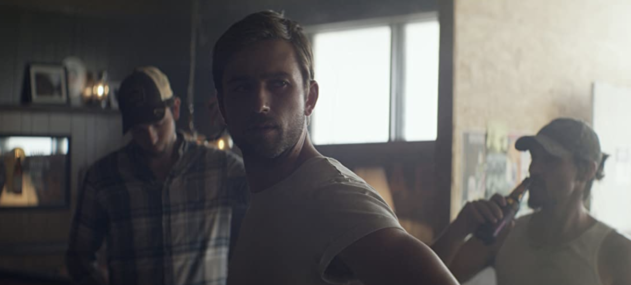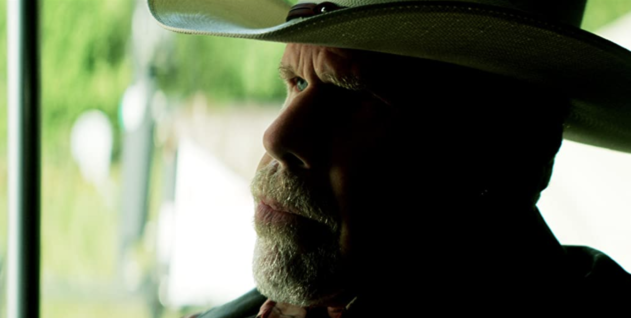It is noir. It is Western. It is thriller. It is character study: “The Big Ugly”
Seeing the trailer for the new film “The Big Ugly” could mislead the viewer into thinking they are in for just another straight-to-video action film cheapie starring Vinnie Jones, who made quite the post-Guy Ritchie films career out of this genre. This assessment would be massively incorrect. Writer/director Scott Wiper’s new film (co-written by Paul Tarantino) is a sharply focused southern thriller that emphasizes mood and character and features a bevy of great performances from both new faces and old.
Set in West Virginia (beautifully lensed against the hills of Kentucky), Wiper’s film follows Vinnie Jones as Neelyn, a British mob enforcer who is loyal to his all-to-forgiving boss Harris (Malcolm McDowell, “Caligula,” “A Clockwork Orange”). While in West Virginia to launder money through an illegal oil drilling deal involving Harris’s American friend and business partner Preston (Ron Perlman), Neelyn’s girlfriend goes missing.
When Harris returns to England, Neelyn stays behind to find his lost love, only to discover she was murdered, and Preston’s unhinged son could be involved. If this turns out to be true, it could prove dangerous to the long-standing business arrangement (and friendship) between Harris and Preston and to the small town in which Preston presides over.
Cinema has long loved films about gangsters from across the pond handling their blood-soaked businesses and seek retribution for betrayals both professional and personal. Films such as Mike Hodges gangster classic “Get Carter,” John Mackenzie’s powerful “The Long Good Friday” and the London mob films of Guy Ritchie (including this year’s “The Gentleman,” which is one of 2020’s finest) get to the meat of their characters and concentrate on motivations and atmosphere, cutting their own unique and memorable cinematic paths.
“The Big Ugly” is a complete pleasure to watch. The way the filmmaker blends British crime film with southern-set thriller is consistently interesting and compelling with dashes of humor thrown in, such as Neelyn getting yelled at by Harris for “getting 86’d from a bar called the fucking Eighty Six!”
As with films of this type, things go wrong, and people pay the price in blood. But Scott Wiper is not interested in recycling worn out clichés and dull scenes of shaky-cam action. The director is interested in character and motivation and what begets the violence. What a welcome relief this is considering some of the screenplays that get produced today.
The character of Neelyn is deeper than a man on the path of revenge. He is presented as a tired soul who is well past the job he does and the lifestyle he lives. His loyalty to Harris is tested right at the beginning of the film, as he is forced to deal with a business problem that involves his close friend. In his eyes and through his narration “God. Land. Oil. It’s often said war is waged over just these three. But we aren’t here for God,” his words set the tone for the film and inform us that Neelyn is done with this life and this trip to West Virginia will be his final job.
Vinnie Jones has never been allowed the kind of character development and inner reflection that he is given here. The actor goes well beyond his tough guy persona. Wiper lets him dig deep and gives him the proper material to do so. To his credit, Vinnie Jones gives an intense and powerful performance here. Certainly, the best of his career.
Wiper and Tarantino’s well-crafted screenplay gift Malcolm McDowell and Ron Perlman two of the finest roles of their later careers.
As Harris, McDowell does not need to exude a forced menace. He is properly set up as a big-time gangster from London. Harris is a rich and successful man and one who surrounds himself with dangerous muscle to let everyone know he is not to be messed with. McDowell is perfect as he downplays the tough guy part and shows Harris as a man who does care for Neelyn although he is fed up with his employee’s actions of late. This is great work from an old school pro.
Ron Perlman can never give a bad performance. It just isn’t in his DNA. His work as Preston is his finest since he played Clay Morrow on FX’s powerful drama, “Sons of Anarchy.” Preston is a man who, while a criminal doing criminal business, loves the land and its people. Although it is misguided, he respects the Earth and his love for the land and his family and business comes from his heart. Even though he knows his drilling will harm the land he claims to love and his son is an out-of-control danger to his way of life, Preston is a man of principle and, right or wrong, stands firm.
Perlman is subdued gravitas in a white cowboy hat. His role is rich in character and the performance is perfection.
Certainly a labor of love for Scott Wiper, the care he took into creating these characters is matched by his casting choices.
Brandon Sklenar is dangerous inside and out as Preston’s son. The actor doesn’t need to resort to showy mannerisms. Junior is a walking and talking stick of dynamite with the fuse already lit and half burned. Sklenar oozes that danger in every word and glance.
The two most surprising characterizations are Will and Kara. Nicholas Braun and Levin Rambin steal every moment as the young couple who met in rehab and are now in love.
Kara still struggles to stay clean, as she treasures her job in the local bar. She explains how being employed allows her to keep focused and gives her a purpose. After meeting her and experiencing Rambin’s subtle and sweet performance, we do not want Kara to fall back into addiction either.
Braun does potent work as Will, as he is tasked with the impossible job of being Junior’s keeper and making sure he stays out of trouble. Will’s job and life is endangered once Junior tells him to stay away from Kara, as Junior wants to revisit the “good old times” he once had with her when she was a drinker.
It is in Will and Kara’s story arc that the film finds a purity and heart. We become fully involved in their story and root for them both.
Add to this Bruce McGill’s work as Milt (Preston’s “Al Neri”) and David Myers Gregory’s down on his luck backwoods rifle expert Thomas, and you have an extremely well-written and performed cast of characters.
For the film’s look, Wiper and his cinematographer Jeremy Osbern went for marvelous lighting designs and brilliant use of space. Osbern fills the frame, using every inch whether it be a wide shot or a two shot. The compositions are quite striking and harken back to the camera styles of Lucien Ballard and Bruce Surtees.
Alex Heffes’s score moves things along but is never intrusive and Wiper’s song choices represent both the British and American sensibilities of the piece. Songs include “Going Underground” by The Jam, “Kiss You All Over” by Exile, and many great Southern-tinged songs from varied Indie Americana artists.
There are many cinematic pleasures to be had in Scott Wiper’s new film. Each moment brings its audience something interesting, increasing its worth from scene to scene. By the time we get to Harris and Preston across from each other, pistols on the table and whiskey in their hands, Wiper assures this is the kind of Western fueled drama that cinema needs so badly.
“The Big Ugly” is London-gangster-film-meets-Walter-Hill, a modern Western that takes pride in its roots. It is noir. It is Western. It is thriller. It is character study. And in almost every moment, it is one of the best films of 2020.
(featured image: Leven Rambin in a still from “The Big Ugly”)
news via inbox
Nulla turp dis cursus. Integer liberos euismod pretium faucibua




